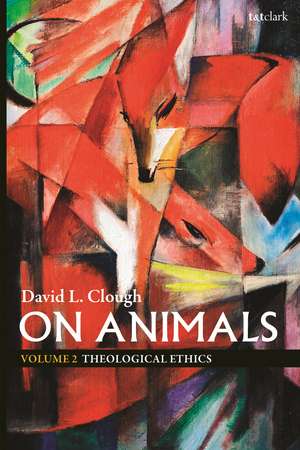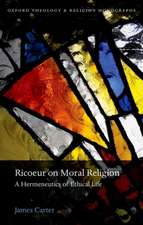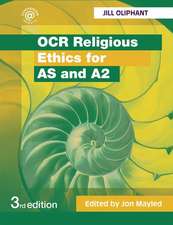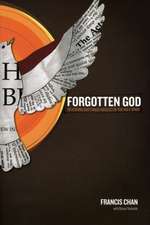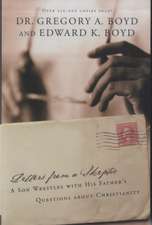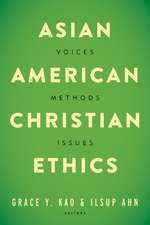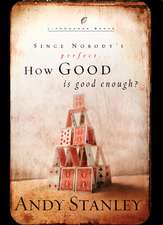On Animals: Volume II: Theological Ethics
Autor Dr David L. Cloughen Limba Engleză Paperback – 10 iun 2020
| Toate formatele și edițiile | Preț | Express |
|---|---|---|
| Paperback (2) | 226.51 lei 6-8 săpt. | |
| Bloomsbury Publishing – 10 iun 2020 | 226.51 lei 6-8 săpt. | |
| Bloomsbury Publishing – 6 noi 2013 | 257.36 lei 6-8 săpt. | +60.20 lei 7-13 zile |
| Hardback (2) | 775.74 lei 6-8 săpt. | |
| Bloomsbury Publishing – 26 dec 2018 | 775.74 lei 6-8 săpt. | |
| Bloomsbury Publishing – feb 2012 | 890.28 lei 6-8 săpt. |
Preț: 226.51 lei
Preț vechi: 289.80 lei
-22% Nou
Puncte Express: 340
Preț estimativ în valută:
43.34€ • 44.72$ • 36.17£
43.34€ • 44.72$ • 36.17£
Carte tipărită la comandă
Livrare economică 26 martie-09 aprilie
Preluare comenzi: 021 569.72.76
Specificații
ISBN-13: 9780567689528
ISBN-10: 0567689522
Pagini: 328
Dimensiuni: 156 x 234 x 17 mm
Greutate: 0.46 kg
Editura: Bloomsbury Publishing
Colecția T&T Clark
Locul publicării:London, United Kingdom
ISBN-10: 0567689522
Pagini: 328
Dimensiuni: 156 x 234 x 17 mm
Greutate: 0.46 kg
Editura: Bloomsbury Publishing
Colecția T&T Clark
Locul publicării:London, United Kingdom
Caracteristici
Offers a definitive guide for how Christians should think about the ethics of using animals for food, clothing, research, labour, sport and entertainment and companions
Notă biografică
David Clough is Professor of Theological Ethics in the Department of Theology and Religious Studies at the University of Chester, UK.
Cuprins
Acknowledgments Introduction Chapter 1: Towards a Christian Animal EthicsChapter 2: Using Other Animals for FoodChapter 3: Using Other Animals for Clothing and TextilesChapter 4: Using Other Animals for LabourChapter 5: Using Other Animals for Research, Medicine and Education Chapter 6: Using Other Animals for Sport and Entertainment Chapter 7: Other Animals as Companions and Pets Chapter 8: Human Impacts on Wild Animals Conclusion BibliographyIndex of Biblical ReferencesIndex of Authors and Subjects
Recenzii
CLOUGH'S BOOK IS crisply written, fast reading, and impressively filled with meticulouslyresearched statistics on human use of domestic animals and human impact upon wild animalsand ecosystems.
This finished work now makes Clough the undisputed leader of the red-hot field of Christian animal ethics . It is an absolute triumph. Now the undisputed seminal text in the field, it will likely stay that way for years (and maybe decades) to come.
There is no more important treatment of ethical questions than David Clough's two-volume work On Animals (Bloomsbury), which he completed last year. The first volume, Systematic Theology, offers a clear-minded theological account of the interconnectedness of all things. The second, Theological Ethics, presents a series of proposals on what those interconnections require of us. Clough seems to have thought through every possible question from every possible angle...
Clough has done an enormous service to the Christian community - and to animal advocates - by developing theological objections to the status quo. On Animals is a major accomplishment, and I hope that it gets the attention it deserves.
Without doubt the finest and most extensive and comprehensively argued work on the theological ethics of animals produced by a Christian ethicist to date.
Readers of Volume One of David Clough's massive work, On Animals, will definitely not be disappointed with Volume Two. In both, his concern is with relationships between human and non-human animals. In the first volume, he probes a systematic theological understanding of doctrinal foundations embedded in creation, reconciliation, and redemption. In this second volume, he frames a critical Christian theological ethic aimed at benefitting both humans and other animals in relation to humans. Clough's reach is astonishing-including humans' need or want for food, help in labor, desire for entertainment, companionship, clothing, medical research, impact on wild animals, and the whole in relation to God. Most important to Clough is genuine human concern for Christians to take seriously the treatment of non-human animals. This yields radical implications for human and Christian practice, especially (though not solely) regarding food. I have seen no other writings that offer such a broad as well as deep overview of what humans are doing to other animals, or what they could do better for their animal neighbors throughout the world.
On Animals I and II together represent the most significant Christian theological and ethical treatment of animals in the history of Christian ethics as an academic discipline. David Clough's devastating analysis of the systematic human mistreatment of animals, especially in the food industry, will have a revolutionary impact, not just on an academic field but on lived Christian behavior -- including my own. Every so often a book is produced that sets the standard for all other work in a field. This is one of those books.
David Clough's much anticipated new volume picks up where he left off in volume one, redefining the very nature of systematic theology, and giving us new eyes to see not only theology but also God's world. No theologian writing today has a deeper or richer understanding of what it means to be a co-creature than Clough. He is our most able theological guide in thinking about animals, food, and the built environment and this text (along with volume 1) is a redefining moment for how we should teach theology and hopefully a redefining moment for how we should live in the world with our animal-kin.
David Clough's On Animals is indisputably the most important and comprehensive theological treatment of animals to have appeared in any language at any time in the Christian tradition.
David Clough develops a careful, thorough, and robust Christian ethics offering an invitational vision for relationships with other animals that is inclusive and non-exploitative. This remarkable and invaluable study will be the definitive work on the subject for many years.
This finished work now makes Clough the undisputed leader of the red-hot field of Christian animal ethics . It is an absolute triumph. Now the undisputed seminal text in the field, it will likely stay that way for years (and maybe decades) to come.
There is no more important treatment of ethical questions than David Clough's two-volume work On Animals (Bloomsbury), which he completed last year. The first volume, Systematic Theology, offers a clear-minded theological account of the interconnectedness of all things. The second, Theological Ethics, presents a series of proposals on what those interconnections require of us. Clough seems to have thought through every possible question from every possible angle...
Clough has done an enormous service to the Christian community - and to animal advocates - by developing theological objections to the status quo. On Animals is a major accomplishment, and I hope that it gets the attention it deserves.
Without doubt the finest and most extensive and comprehensively argued work on the theological ethics of animals produced by a Christian ethicist to date.
Readers of Volume One of David Clough's massive work, On Animals, will definitely not be disappointed with Volume Two. In both, his concern is with relationships between human and non-human animals. In the first volume, he probes a systematic theological understanding of doctrinal foundations embedded in creation, reconciliation, and redemption. In this second volume, he frames a critical Christian theological ethic aimed at benefitting both humans and other animals in relation to humans. Clough's reach is astonishing-including humans' need or want for food, help in labor, desire for entertainment, companionship, clothing, medical research, impact on wild animals, and the whole in relation to God. Most important to Clough is genuine human concern for Christians to take seriously the treatment of non-human animals. This yields radical implications for human and Christian practice, especially (though not solely) regarding food. I have seen no other writings that offer such a broad as well as deep overview of what humans are doing to other animals, or what they could do better for their animal neighbors throughout the world.
On Animals I and II together represent the most significant Christian theological and ethical treatment of animals in the history of Christian ethics as an academic discipline. David Clough's devastating analysis of the systematic human mistreatment of animals, especially in the food industry, will have a revolutionary impact, not just on an academic field but on lived Christian behavior -- including my own. Every so often a book is produced that sets the standard for all other work in a field. This is one of those books.
David Clough's much anticipated new volume picks up where he left off in volume one, redefining the very nature of systematic theology, and giving us new eyes to see not only theology but also God's world. No theologian writing today has a deeper or richer understanding of what it means to be a co-creature than Clough. He is our most able theological guide in thinking about animals, food, and the built environment and this text (along with volume 1) is a redefining moment for how we should teach theology and hopefully a redefining moment for how we should live in the world with our animal-kin.
David Clough's On Animals is indisputably the most important and comprehensive theological treatment of animals to have appeared in any language at any time in the Christian tradition.
David Clough develops a careful, thorough, and robust Christian ethics offering an invitational vision for relationships with other animals that is inclusive and non-exploitative. This remarkable and invaluable study will be the definitive work on the subject for many years.
Descriere
Descriere de la o altă ediție sau format:
Presents a project in systematic theology: a rigorous engagement with the Christian tradition in relation to animals under the doctrinal headings of creation, reconciliation and redemption and in dialogue with the Bible and theological voices central to the tradition.
Presents a project in systematic theology: a rigorous engagement with the Christian tradition in relation to animals under the doctrinal headings of creation, reconciliation and redemption and in dialogue with the Bible and theological voices central to the tradition.
